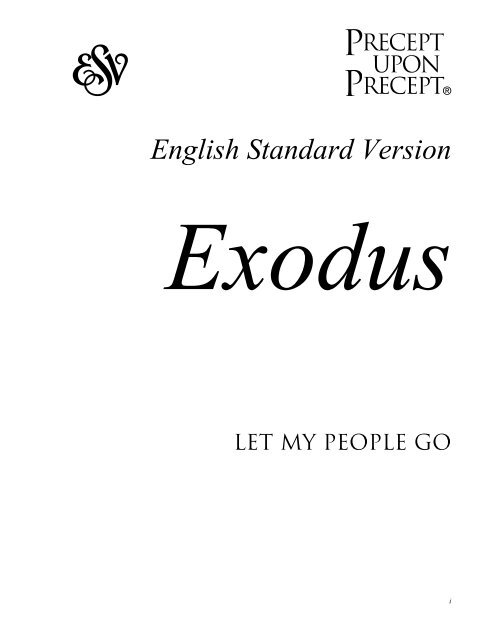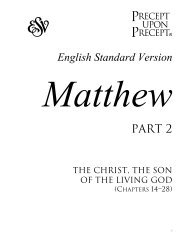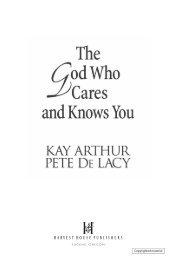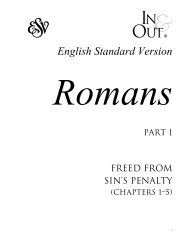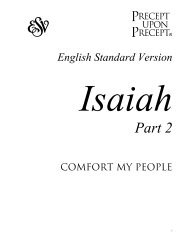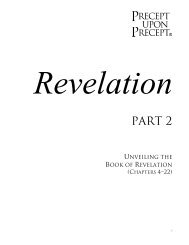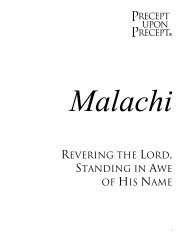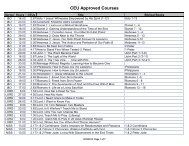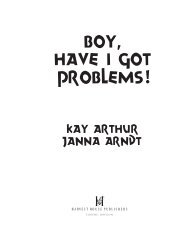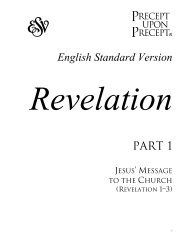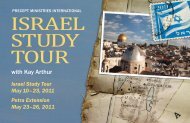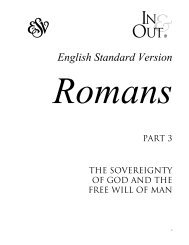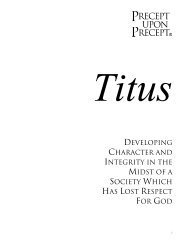Exodus PUP (ESV) - Precept Ministries International | Bible
Exodus PUP (ESV) - Precept Ministries International | Bible
Exodus PUP (ESV) - Precept Ministries International | Bible
Create successful ePaper yourself
Turn your PDF publications into a flip-book with our unique Google optimized e-Paper software.
English Standard Version<strong>Exodus</strong>Let My People Goi
PRECEPT UPON PRECEPT ®English Standard VersionexodusLet My People Go© 2013 <strong>Precept</strong> <strong>Ministries</strong> <strong>International</strong>. All rights reserved.This material is published by and is the sole property of <strong>Precept</strong> <strong>Ministries</strong><strong>International</strong> of Chattanooga, Tennessee. No part of this publication may bereproduced, translated, or transmitted in any form or by any means, electronic ormechanical, including photocopying, recording, or any information storage andretrieval system, without permission in writing from the publisher.<strong>Precept</strong>, <strong>Precept</strong> <strong>Ministries</strong> <strong>International</strong>, <strong>Precept</strong> <strong>Ministries</strong><strong>International</strong> The Inductive <strong>Bible</strong> Study People,the Plumb Bob design, <strong>Precept</strong> Upon <strong>Precept</strong>, In & Out, Sweeter than Chocolate!,Cookies on the Lower Shelf, <strong>Precept</strong>s For Life, <strong>Precept</strong>s From God’s Word andTransform Student <strong>Ministries</strong> are trademarks of <strong>Precept</strong> <strong>Ministries</strong> <strong>International</strong>.Scripture take from <strong>ESV</strong> <strong>Bible</strong> (The Holy <strong>Bible</strong>, English Standard Version®).Copyright © 2001 by Crossway, a publishing ministry of Good News Publishers.Used by permission. All rights reserved.1 st editionPrinted in the United States of Americaii
CONTENTSPAGEL ESSONS1 LESSON ONE: Chapters 1-415 LESSON TWO: Chapters 4-727 LESSON THREE: Chapters 7-1033 LESSON FOUR: Chapters 11-1341 LESSON FIVE: Chapters 14-1651 LESSON SIX: Chapters 17-1859 LESSON SEVEN: Chapters 19-2075 LESSON EIGHT: Chapters 21-2481 LESSON NINE: Chapters 25-3199 LESSON TEN: Chapters 32-33107 LESSON ELEVEN: Chapters 34-40A PPENDIX123 Observation Worksheets235 <strong>Exodus</strong> at a Glance237 Mapiii
HELPFUL STUDY TOOLSH ELPFUL S TUDY T OOLSARTHUR, KAY; ARTHUR, DAVID; DE LACY, PETEThe New How to Study Your <strong>Bible</strong>Eugene, Oregon: Harvest House Publishers, 2010The New Inductive Study <strong>Bible</strong>Eugene, Oregon: Harvest House Publishers, 2013Hebrew Word Study Tools(The following is a list of helpful Hebrew Word Study Tools:)HARRIS, R. LAIRD; ARCHER, GLEASON L. JR.; WALTKE, BRUCE K.Theological Wordbook of the Old TestamentChicago, Illinois: Moody Press, 1980.ZODHIATES, SPIROSThe Complete Word Study Old TestamentChattanooga, Tennessee: AMG Publishers, 1994.BAKER, WARREN, CARPENTER, EUGENEThe Complete Word Study Dictionary, Old TestamentChattanooga, Tennessee: AMG Publishers, 2003R ECOMMENDED C OMMENTARIESCOLE, R. ALANTyndale Old Testament Commentaries: <strong>Exodus</strong>London: Inter-Varsity Press, 1973GAEBELEIN, FRANK E.The Expositor’s <strong>Bible</strong> Commentary: Genesis, <strong>Exodus</strong>, Leviticus, NumbersGrand Rapids, Michigan: Zondervan Publishing House, 1990.WALVOORD, JOHN F., ZUCK, ROY B., EDS.The <strong>Bible</strong> Knowledge Commentary: An Exposition of the ScripturesWheaton, Illinois: Victor Books, 1983-c1985R ECOMMENDED S OFTWARELogos <strong>Bible</strong> SoftwarePowerful search engines and up to 4,000 electronic <strong>Bible</strong> study resources (commentaries,lexicons, <strong>Bible</strong> dictionaries etc.) make it fast and easy to do simple and complex searchesof multiple sources, then pull materials together for orderly presentation—excellent forword and topical studies based on English or original Hebrew and Greek. Available atwww.logos.comv
<strong>Precept</strong> <strong>Ministries</strong> <strong>International</strong>P.O. Box 182218Chattanooga, TN 37422<strong>Exodus</strong>Lesson 1, Chapters 1–4LESSON ONEChapters One through FourTHIS LESSONINCORPORATESThe following located in the Appendix:Observation Worksheets of <strong>Exodus</strong> 1–4“<strong>Exodus</strong> at a Glance” chartCross-referencesHow sure are the promises of God made so long ago?DAYONEAs you open the Word of God, remember that this is God’s book given to you thatyou might know Him, understand His ways, love Him with all your heart, mind,body, soul, and spirit, and show this by keeping His commandments. Therefore, it isalways wise to begin each study in prayer, asking God to speak to you by His Spirit,through His Word.Remember, Beloved of God, that the enemy of your soul does not want you to bein the Word. Thus, he will do what he can to deter and distract you, but he cannotstop you from persevering.Also remember that the good can be the enemy of the best. Busyness with thework of God can keep you from the Word of God. Yet, it is clear from Scripturethat the Word of God is the foundation for all that we believe and do. Therefore,to neglect it is parallel to trying to live and work without food, which leads tosickness and death. You cannot neglect the study of God’s Word and bespiritually healthy. Look at the church today, and you will see how true this is.Finally, remember that getting one day’s work done is better than getting nothingdone. So do whatever you can. Don’t let the fact that you may not always be ableto complete each week’s study keep you from doing what you can. This isspiritual food; get as much as you can.1. To really appreciate the book of <strong>Exodus</strong> and to understand the significance ofthe events that occur in this phase of Israel’s history, we need to start ourstudy with several passages in Genesis.Let’s look at the promise God gave to Abraham, Isaac, and Jacob—the© 2013 <strong>Precept</strong> <strong>Ministries</strong> <strong>International</strong> 1
<strong>Exodus</strong>Lesson 1, Chapters 1–4promise of a land as an everlasting possession. As you look up each reference,you might want to mark the word land. Also note what you learn from the textregarding the land. If the text answers any of the 5 Ws and an H (who, what,when, where, why, and how), record it next to the verse.Using the back of the perforated card on the back cover of your <strong>Precept</strong> book,record each key word and how you intend to mark it on your ObservationWorksheets or in your <strong>Bible</strong>. This will be a helpful reminder, and you can addnew key words as you continue to study <strong>Exodus</strong>. The word covenant shouldalways be on your key word list because everything God does is based oncovenant.a. Genesis 12:1-7—According to Acts 7:2-5 and Genesis 15:7, the Lord’s callcame to Abraham when he was living with his family in Ur of the Chaldeans.b. Genesis 13:14-18c. Genesis 15:13-182© 2013 <strong>Precept</strong> <strong>Ministries</strong> <strong>International</strong>
<strong>Exodus</strong>Lesson 1, Chapters 1–4d. Genesis 26:1-6e. Genesis 28:10-15f. Genesis 37:23-28g. Genesis 41:41h. Genesis 46:2-42. Read Genesis 50. If you have not done so before, you might want to mark anyreference to Egypt and any reference to the land promised by oath toAbraham, Isaac, and Jacob. Also remember that God changed Jacob’s name toIsrael in Genesis 32:24-28, so both names refer to the same man and are usedinterchangeably.© 2013 <strong>Precept</strong> <strong>Ministries</strong> <strong>International</strong> 3
<strong>Exodus</strong>Lesson 1, Chapters 1–43. There is a map on page 11 that will show you the boundaries of the landpromised to the offspring of Abraham, Isaac, and Jacob as an everlastingpossession. If God promised Abraham and his offspring this land as aneverlasting possession, will it happen?4. Now in the light of what you saw in Genesis, read <strong>Exodus</strong> 1. The book of<strong>Exodus</strong> is printed out in the Appendix.As you read this chapter, double underline references to location because thisanswers the question “where” and, thus, gives you the geographicalcontext of the beginning of <strong>Exodus</strong>. Also mark references that would giveyou an indication of when something occurs. We suggest you mark timewith a green clock like this because it is easy to see at a glance.b. Observe who the main persons are in this chapter. List them and the factsyou observed about them on the page entitled “The Main Characters of<strong>Exodus</strong> 1” at the end of this lesson. Record the facts that will help youunderstand these people. These facts will tell you either who, what, when,where, why, or how. You will want to record what you learn about thesons of Israel, the king of Egypt who is referred to as Pharaoh, and themidwives.DAYTWOOur focus today will be <strong>Exodus</strong> 2 and the birth and early years of Moses, a manwhose name you will find repeated time and time again throughout the Word ofGod. You are going to learn so much from this awesome book, Beloved, and wecount it such a privilege to study it with you. What a privilege God has given us inpartnering with you in one of the most noble endeavors of a person’s life—that oflearning the Word of God. Here is pure, unadulterated truth—truth that will equipyou for every good work of life! As you discover more and more about God andHis ways, you will find life so much easier to understand and cope with becauseyou will have the insight and wisdom of God to guide you.1. Read your Observation Worksheet on <strong>Exodus</strong> 2 and mark every reference toMoses in a distinctive color or way.a. We will not ask you to mark Moses throughout <strong>Exodus</strong>; however, sincethis is our introduction to Moses and it is important to get all the factsstraight, this is our suggestion for this chapter.b. By the way, don’t forget to mark references to geographical location andtime. These are important observations.4© 2013 <strong>Precept</strong> <strong>Ministries</strong> <strong>International</strong>
<strong>Exodus</strong>Lesson 1, Chapters 1–42. When you finish, record below important insights on Moses that answer the 5Ws and an H questions including the verses they are taken from. Tomorrowwe are going to look at some New Testament passages that give us evenfurther insight into Moses.3. Finally, when you read <strong>Exodus</strong> 2:24, doesn’t it thrill your heart to realize whatis behind the words, “and God remembered his covenant with Abraham, withIsaac, and with Jacob,” and to know where in Genesis that covenant wasestablished? Record below the cross-reference you would use to explain thisverse to others.© 2013 <strong>Precept</strong> <strong>Ministries</strong> <strong>International</strong> 5
<strong>Exodus</strong>Lesson 1, Chapters 1–4DAYTHREEDidn’t you enjoy yesterday’s lesson, just stopping long enough to really get abetter understanding of Moses’ birth and the early years of his life! And weren’tyou thrilled at the way our Sovereign God brings about His purposes! Whatconfidence this ought to bring to your life, and that confidence will only grow,Beloved, with the study of this foundational book.1. Today, you need to read Acts 7:15-30. However, if you have time, it would begood to see what preceded these verses as Stephen, under the inspiration ofthe Holy Spirit, recounted to the Jews the summarization of the history ofIsrael before they stoned him to death.Once again mark every reference to Moses. If you receive additional insightsinto Moses and his life, record them with the information you listed on theprevious page in Day Two.2. Now read Hebrews 11:22-29 and do as you just did with the passage in Acts.This passage in Hebrews will take us beyond the time of <strong>Exodus</strong> 2, but it willcertainly show us how Moses lived.3. Beloved, it is always good to stop and reflect on what you have read anddiscuss it with God. Is there anything you’ve learned that you might apply toyour life by way of example, any insights into God that would especially helpyou, knowing that God never changes?Even if you have only two to three minutes for this, it is still worth it to sitquietly and think about the things you have learned. Then, jot down a sentenceor two. If you are keeping a journal on God, you may want to write in it. Somuch will be learned about God throughout the study of <strong>Exodus</strong>, we suggestthat if you have not already started a journal on God, now is a good time tostart one. Just take time to be still and remember that He is God. We will leaveyou some space to write.6© 2013 <strong>Precept</strong> <strong>Ministries</strong> <strong>International</strong>
<strong>Exodus</strong>Lesson 1, Chapters 1–44. Finally, in observing these New Testament passages on Moses, did you gainany new insights into his life or anything that illuminated the sequence ofevents? List them below because this shows how Scripture interprets orenlightens Scripture. Also, you may want to note these references in themargin of your <strong>Bible</strong> next to the related verses in <strong>Exodus</strong>.Do you realize how much you have learned, Beloved of God, just in these pastthree days? And you have seen it for yourself! Persevere...you are going to learnso much about God that will transform your life, that will give you a depth ofunderstanding as to why God refers to you as “Beloved” so often in His Word.DAYFOUR1. Read <strong>Exodus</strong> 3:1–4:17. Mark each reference to time and locations as you havedone in the past. When you mark locations, don’t forget to mark the mountainof God as a geographical location because it is very significant throughout<strong>Exodus</strong>. Mark mountain of God and its synonyms in a distinctive waythroughout the book.Also as you move into chapter 4, mark the word staff.a. Who are the main characters in this passage?b. What is the main subject of <strong>Exodus</strong> 3:1–4:17?© 2013 <strong>Precept</strong> <strong>Ministries</strong> <strong>International</strong> 7
<strong>Exodus</strong>Lesson 1, Chapters 1–4c. When does <strong>Exodus</strong> 3:1–4:17 occur?d. Where does it occur?e. Why does it occur? What provoked all this?f. Did you notice any key words that jumped out at you in this first reading?If so, list them below and devise a way to mark them. After listing them,you might want to mark them accordingly.2. Having read <strong>Exodus</strong> 3:1–4:17, we are going to turn our attention for theremainder of the week to <strong>Exodus</strong> 3. We’re sure you noticed that theconversation between Moses and God doesn’t end at <strong>Exodus</strong> 3:22. This will,however, be our parameter of study from this point on so you won’t beoverwhelmed with homework.3. Read <strong>Exodus</strong> 3 again. It would be good to read it aloud. It helps you retainmore of what you read when you read it aloud, over and over. Mark thefollowing key words: affliction (suffering, oppression), cry (cried). Also lookat <strong>Exodus</strong> 1:11-12 and <strong>Exodus</strong> 2:23 and mark the same words as they appearin these verses. While you are in <strong>Exodus</strong> 2:23, devise a way to mark the wordslavery and mark it accordingly.4. Now stop and reflect on the situation of the Jews. Try to imagine what itwould be like to live under those conditions...the slavery of it all, the whip ofthe cruel taskmaster. Maybe you are there—enslaved, but not by a taskmasterwhose whip is easily seen with the naked eye.You might want to bring today’s study to a close by reading John 8:31-36.Maybe like the Jews mentioned in verse 31, you believe there is a God.Maybe you acknowledge His Son, Jesus Christ, but are you truly His disciple,His learner and follower? Are you enslaved, in bondage, afflicted by8© 2013 <strong>Precept</strong> <strong>Ministries</strong> <strong>International</strong>
<strong>Exodus</strong>Lesson 1, Chapters 1–4persistent, unrelenting sin? Or have you been set free? Think about what John8:31-36 is teaching, and parallel it with the picture of the Egyptians. Do youneed to call out to God because of your bondage, your torment? If so, do so,Beloved. God has you in this course for a purpose.DAYFIVE1. Start your time of study by reading <strong>Exodus</strong> 3 again. This time mark in adistinctive color the questions asked by Moses in this chapter. Mark only thequestions, nothing else. Coloring them will help you see them quickly, andthis is important.2. Now note the questions Moses asks God in <strong>Exodus</strong> 3:11, 13. Record thequestions below, and then write out God’s response to each of them. Whenyou record God’s response, list the main points of His answer. Don’t rewritethe text below; rather, make sure you sort out each thing that God says willtake place.Moses’ QuestionsGod’s Response© 2013 <strong>Precept</strong> <strong>Ministries</strong> <strong>International</strong> 9
<strong>Exodus</strong>Lesson 1, Chapters 1–43. As this week in the Word comes to a close, it would be good to stop andreflect on all that you’ve learned about God as you have observed <strong>Exodus</strong> 1–3. This will be a real faith builder in your life. As you think about the manythings you’ve observed about God, it will be a blessing to record it below or inyour journal on God.As you go through this wonderful exercise, you will find it very profitable notto rush, but to take time to worship God through prayer or praise...or maybethrough confession for failing to live in the light of who God is. To worshipGod is to acknowledge God for who He is, to look at His worth and respondaccordingly.4. Finally, Beloved, record the main themes of <strong>Exodus</strong> 1–3 on the “<strong>Exodus</strong> at aGlance” chart,. located in the Appendix. Don’t labor over the themes; theyshould simply tell you what the chapters are generally about.As you finished your first week of study, did you hear His “well done”? We aresure you have pleased Him, for you have truly listened to what He has to say. Youhave given it close attention!10© 2013 <strong>Precept</strong> <strong>Ministries</strong> <strong>International</strong>
<strong>Exodus</strong>Lesson 1, Chapters 1–4This map is based upon information from The Moody Atlas of <strong>Bible</strong> Lands, Moody Press, 1985.© 2013 <strong>Precept</strong> <strong>Ministries</strong> <strong>International</strong> 11
12© 2013 <strong>Precept</strong> <strong>Ministries</strong> <strong>International</strong>
<strong>Exodus</strong>Lesson 1, Chapters 1–4THE MAIN CHARACTERS OF EXODUS 1© 2013 <strong>Precept</strong> <strong>Ministries</strong> <strong>International</strong> 13
14© 2013 <strong>Precept</strong> <strong>Ministries</strong> <strong>International</strong>
<strong>Exodus</strong>Chapter 1EXODUS 1Observation WorksheetChapter Theme _________________________________________________________________THESE are the names of the sons of Israel who came to Egypt with Jacob,each with his household:2 Reuben, Simeon, Levi, and Judah,3 Issachar, Zebulun, and Benjamin,4 Dan and Naphtali, Gad and Asher.5 All the descendants of Jacob were seventy persons; Joseph was already inEgypt.6 Then Joseph died, and all his brothers and all that generation.7 But the people of Israel were fruitful and increased greatly; they multipliedand grew exceedingly strong, so that the land was filled with them.8 Now there arose a new king over Egypt, who did not know Joseph.9 And he said to his people, “Behold, the people of Israel are too many andtoo mighty for us.10 “Come, let us deal shrewdly with them, lest they multiply, and, if warbreaks out, they join our enemies and fight against us and escape from theland.”11 Therefore they set taskmasters over them to afflict them with heavy burdens.They built for Pharaoh store cities, Pithom and Raamses.12 But the more they were oppressed, the more they multiplied and the morethey spread abroad. And the Egyptians were in dread of the people of Israel.13 So they ruthlessly made the people of Israel work as slaves14 and made their lives bitter with hard service, in mortar and brick, and in allkinds of work in the field. In all their work they ruthlessly made them workas slaves.15 Then the king of Egypt said to the Hebrew midwives, one of whom wasnamed Shiphrah and the other Puah,16 “When you serve as midwife to the Hebrew women and see them on thebirthstool, if it is a son, you shall kill him, but if it is a daughter, she shalllive.”17 But the midwives feared God and did not do as the king of Egyptcommanded them, but let the male children live.© 2013 <strong>Precept</strong> <strong>Ministries</strong> <strong>International</strong> 123
<strong>Exodus</strong>Chapter 118 So the king of Egypt called the midwives and said to them, “Why have youdone this, and let the male children live?”19 The midwives said to Pharaoh, “Because the Hebrew women are not like theEgyptian women, for they are vigorous and give birth before the midwifecomes to them.”20 So God dealt well with the midwives. And the people multiplied and grewvery strong.21 And because the midwives feared God, he gave them families.22 Then Pharaoh commanded all his people, “Every son that is born to theHebrews you shall cast into the Nile, but you shall let every daughter live.”124© 2013 <strong>Precept</strong> <strong>Ministries</strong> <strong>International</strong>
<strong>Exodus</strong>Chapter 2eXODUS 2Observation WorksheetChapter Theme _________________________________________________________________NOW a man from the house of Levi went and took as his wife a Levitewoman.2 The woman conceived and bore a son, and when she saw that he was a finechild, she hid him three months.3 When she could hide him no longer, she took for him a basket made ofbulrushes and daubed it with bitumen and pitch. She put the child in it andplaced it among the reeds by the river bank.4 And his sister stood at a distance to know what would be done to him.5 Now the daughter of Pharaoh came down to bathe at the river, while heryoung women walked beside the river. She saw the basket among the reedsand sent her servant woman, and she took it.6 When she opened it, she saw the child, and behold, the baby was crying. Shetook pity on him and said, “This is one of the Hebrews’ children.”7 Then his sister said to Pharaoh’s daughter, “Shall I go and call you a nursefrom the Hebrew women to nurse the child for you?”8 And Pharaoh’s daughter said to her, “Go.” So the girl went and called thechild’s mother.9 And Pharaoh’s daughter said to her, “Take this child away and nurse him forme, and I will give you your wages.” So the woman took the child andnursed him.10 When the child grew older, she brought him to Pharaoh’s daughter, and hebecame her son. She named him Moses, “Because,” she said, “I drew himout of the water.”11 One day, when Moses had grown up, he went out to his people and lookedon their burdens, and he saw an Egyptian beating a Hebrew, one of hispeople.12 He looked this way and that, and seeing no one, he struck down theEgyptian and hid him in the sand.13 When he went out the next day, behold, two Hebrews were strugglingtogether. And he said to the man in the wrong, “Why do you strike yourcompanion?”© 2013 <strong>Precept</strong> <strong>Ministries</strong> <strong>International</strong> 125
<strong>Exodus</strong>Chapter 214 He answered, “Who made you a prince and a judge over us? Do you meanto kill me as you killed the Egyptian?” Then Moses was afraid, and thought,“Surely the thing is known.”15 When Pharaoh heard of it, he sought to kill Moses. But Moses fled fromPharaoh and stayed in the land of Midian. And he sat down by a well.16 Now the priest of Midian had seven daughters, and they came and drewwater and filled the troughs to water their father’s flock.17 The shepherds came and drove them away, but Moses stood up and savedthem, and watered their flock.18 When they came home to their father Reuel, he said, “How is it that youhave come home so soon today?”19 They said, “An Egyptian delivered us out of the hand of the shepherds andeven drew water for us and watered the flock.”20 He said to his daughters, “Then where is he? Why have you left the man?Call him, that he may eat bread.”21 And Moses was content to dwell with the man, and he gave Moses hisdaughter Zipporah.22 She gave birth to a son, and he called his name Gershom, for he said, “Ihave been a sojourner in a foreign land.”23 During those many days the king of Egypt died, and the people of Israelgroaned because of their slavery and cried out for help. Their cry for rescuefrom slavery came up to God.24 And God heard their groaning, and God remembered his covenant withAbraham, with Isaac, and with Jacob.25 God saw the people of Israel—and God knew.126© 2013 <strong>Precept</strong> <strong>Ministries</strong> <strong>International</strong>
<strong>Exodus</strong>Chapter 3eXODUS 3Observation WorksheetChapter Theme _________________________________________________________________1 NOW Moses was keeping the flock of his father-in-law, Jethro, the priestof Midian, and he led his flock to the west side of the wilderness and cameto Horeb, the mountain of God.2 And the angel of the LORD appeared to him in a flame of fire out of themidst of a bush. He looked, and behold, the bush was burning, yet it was notconsumed.3 And Moses said, “I will turn aside to see this great sight, why the bush is notburned.”4 When the LORD saw that he turned aside to see, God called to him out of thebush, “Moses, Moses!” And he said, “Here I am.”5 Then he said, “Do not come near; take your sandals off your feet, for theplace on which you are standing is holy ground.”6 And he said, “I am the God of your father, the God of Abraham, the God ofIsaac, and the God of Jacob.” And Moses hid his face, for he was afraid tolook at God.7 Then the LORD said, “I have surely seen the affliction of my people who arein Egypt and have heard their cry because of their taskmasters. I know theirsufferings,8 and I have come down to deliver them out of the hand of the Egyptians andto bring them up out of that land to a good and broad land, a land flowingwith milk and honey, to the place of the Canaanites, the Hittites, theAmorites, the Perizzites, the Hivites, and the Jebusites.9 “And now, behold, the cry of the people of Israel has come to me, and Ihave also seen the oppression with which the Egyptians oppress them.10 “Come, I will send you to Pharaoh that you may bring my people, thechildren of Israel, out of Egypt.”11 But Moses said to God, “Who am I that I should go to Pharaoh and bring thechildren of Israel out of Egypt?”12 He said, “But I will be with you, and this shall be the sign for you, that Ihave sent you: when you have brought the people out of Egypt, you shallserve God on this mountain.”© 2013 <strong>Precept</strong> <strong>Ministries</strong> <strong>International</strong> 127
<strong>Exodus</strong>Chapter 313 Then Moses said to God, “If I come to the people of Israel and say to them,‘The God of your fathers has sent me to you,’ and they ask me, ‘What is hisname?’ what shall I say to them?”14 God said to Moses, “I AM WHO I AM.” And he said, “Say this to the people ofIsrael, ‘I AM has sent me to you.’ ”15 God also said to Moses, “Say this to the people of Israel, ‘The LORD, theGod of your fathers, the God of Abraham, the God of Isaac, and the God ofJacob, has sent me to you.’ This is my name forever, and thus I am to beremembered throughout all generations.16 “Go and gather the elders of Israel together and say to them, ‘The LORD, theGod of your fathers, the God of Abraham, of Isaac, and of Jacob, hasappeared to me, saying, “I have observed you and what has been done toyou in Egypt,17 and I promise that I will bring you up out of the affliction of Egypt to theland of the Canaanites, the Hittites, the Amorites, the Perizzites, the Hivites,and the Jebusites, a land flowing with milk and honey.” ’18 “And they will listen to your voice, and you and the elders of Israel shall goto the king of Egypt and say to him, ‘The LORD, the God of the Hebrews,has met with us; and now, please let us go a three days’ journey into thewilderness, that we may sacrifice to the LORD our God.’19 “But I know that the king of Egypt will not let you go unless compelled by amighty hand.20 “So I will stretch out my hand and strike Egypt with all the wonders that Iwill do in it; after that he will let you go.21 “And I will give this people favor in the sight of the Egyptians; and whenyou go, you shall not go empty,22 but each woman shall ask of her neighbor, and any woman who lives in herhouse, for silver and gold jewelry, and for clothing. You shall put them onyour sons and on your daughters. So you shall plunder the Egyptians.”128© 2013 <strong>Precept</strong> <strong>Ministries</strong> <strong>International</strong>
<strong>Exodus</strong>Chapter 4eXODUS 4Observation WorksheetChapter Theme _________________________________________________________________1 THEN Moses answered, “But behold, they will not believe me or listen tomy voice, for they will say, ‘The LORD did not appear to you.’ ”2 The LORD said to him, “What is that in your hand?” He said, “A staff.”3 And he said, “Throw it on the ground.” So he threw it on the ground, and itbecame a serpent, and Moses ran from it.4 But the LORD said to Moses, “Put out your hand and catch it by the tail”—sohe put out his hand and caught it, and it became a staff in his hand—5 “that they may believe that the LORD, the God of their fathers, the God ofAbraham, the God of Isaac, and the God of Jacob, has appeared to you.”6 Again, the LORD said to him, “Put your hand inside your cloak.” And he puthis hand inside his cloak, and when he took it out, behold, his hand wasleprous like snow.7 Then God said, “Put your hand back inside your cloak.” So he put his handback inside his cloak, and when he took it out, behold, it was restored likethe rest of his flesh.8 “If they will not believe you,” God said, “or listen to the first sign, they maybelieve the latter sign.9 “If they will not believe even these two signs or listen to your voice, you shalltake some water from the Nile and pour it on the dry ground, and the waterthat you shall take from the Nile will become blood on the dry ground.”10 But Moses said to the LORD, “Oh, my Lord, I am not eloquent, either in thepast or since you have spoken to your servant, but I am slow of speech andof tongue.”11 Then the LORD said to him, “Who has made man’s mouth? Who makes himmute, or deaf, or seeing, or blind? Is it not I, the LORD?12 “Now therefore go, and I will be with your mouth and teach you what youshall speak.”13 But he said, “Oh, my Lord, please send someone else.”14 Then the anger of the LORD was kindled against Moses and he said, “Isthere not Aaron, your brother, the Levite? I know that he can speak well.© 2013 <strong>Precept</strong> <strong>Ministries</strong> <strong>International</strong> 129
<strong>Exodus</strong>Chapter 4Behold, he is coming out to meet you, and when he sees you, he will be gladin his heart.15 “You shall speak to him and put the words in his mouth, and I will be withyour mouth and with his mouth and will teach you both what to do.16 “He shall speak for you to the people, and he shall be your mouth, and youshall be as God to him.17 “And take in your hand this staff, with which you shall do the signs.”18 Moses went back to Jethro his father-in-law and said to him, “Please let mego back to my brothers in Egypt to see whether they are still alive.” AndJethro said to Moses, “Go in peace.”19 And the LORD said to Moses in Midian, “Go back to Egypt, for all the menwho were seeking your life are dead.”20 So Moses took his wife and his sons and had them ride on a donkey, and wentback to the land of Egypt. And Moses took the staff of God in his hand.21 And the LORD said to Moses, “When you go back to Egypt, see that you dobefore Pharaoh all the miracles that I have put in your power. But I willharden his heart, so that he will not let the people go.22 “Then you shall say to Pharaoh, ‘Thus says the LORD, Israel is my firstbornson,23 and I say to you, “Let my son go that he may serve me.” If you refuse to lethim go, behold, I will kill your firstborn son.’ ”24 At a lodging place on the way the LORD met him and sought to put him todeath.25 Then Zipporah took a flint and cut off her son’s foreskin and touchedMoses’ feet with it and said, “Surely you are a bridegroom of blood to me!”26 So he let him alone. It was then that she said, “A bridegroom of blood,”because of the circumcision.27 The LORD said to Aaron, “Go into the wilderness to meet Moses.” So hewent and met him at the mountain of God and kissed him.28 And Moses told Aaron all the words of the LORD with which he had senthim to speak, and all the signs that he had commanded him to do.29 Then Moses and Aaron went and gathered together all the elders of thepeople of Israel.30 Aaron spoke all the words that the LORD had spoken to Moses and did thesigns in the sight of the people.31 And the people believed; and when they heard that the LORD had visited thepeople of Israel and that he had seen their affliction, they bowed their headsand worshiped.130© 2013 <strong>Precept</strong> <strong>Ministries</strong> <strong>International</strong>
<strong>Exodus</strong><strong>Exodus</strong> at a GlanceEXODUS AT A GLANCETheme of <strong>Exodus</strong>:1Chapter Theme(s)23456789101112131415161718© 2013 <strong>Precept</strong> <strong>Ministries</strong> <strong>International</strong> 235
<strong>Exodus</strong><strong>Exodus</strong> at a Glance19202122232425262728293031323334353637383940236© 2013 <strong>Precept</strong> <strong>Ministries</strong> <strong>International</strong>


